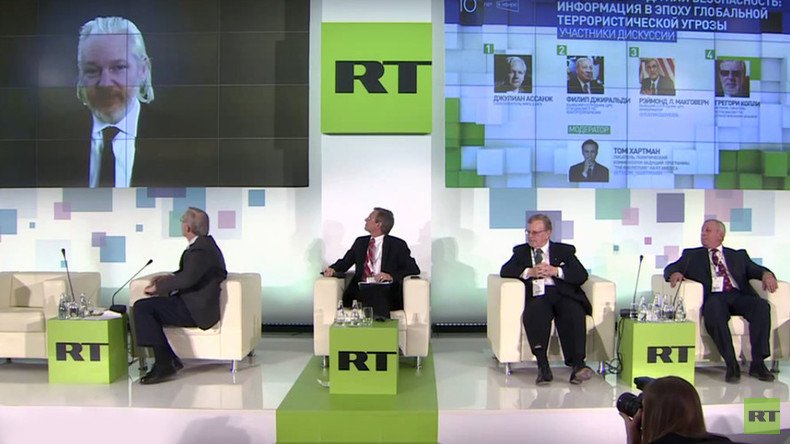Game for privacy is gone, mass surveillance is here to stay – Assange on #RT10 panel

Humanity has lost its battle for privacy and must now learn to live in a world where mass surveillance is becoming cheaper for governments to implement, WikiLeaks founder Julian Assange said during a panel dedicated to RT’s 10th anniversary.
TIMELINE: #RT10 anniversary event on shape-shifting powers in today’s world
Assange addressed the panel on security and surveillance hosted by RT in central Moscow on Thursday via videoconference from the Ecuadorian embassy in London, where he has remained holed up for the last three years in order to avoid extradition to Sweden.
When offered a chance to comment on the session’s topic – “Security or Surveillance: Can the right to privacy and effective anti-terror security coexist in the digital age?” – the whistleblower asked the moderator, and host of The Big Picture Show on RT American, Thom Hartmann: “How long have you got, Tom?” implying he has a lot to say on the issue.
But it was Assange’s only joke during the event, as his reply turned out to be gravely serious and in many respects depressing.
“In thinking about this issue I want to take quite a different position, perhaps, from what you would expect me to have taken… I think that we should understand that the game for privacy is gone. It’s gone. The mass surveillance is here to stay,” he said.
Mass surveillance is already being implemented not only by major world powers, but also by some medium and small-sized countries, he added.
“The Five Eyes intelligence arrangement [of Australia, Canada, New Zealand, the UK and the US]… is so evasive in terms of mass surveillance of domestic and international telecommunications that while some experts can achieve practical privacy for themselves for limited number of operations… it’s gone for the rest of the populations,” the WikiLeaks founder stressed.
International terrorists are among those “experts” capable of making their communications invisible for security agencies, he added.
READ MORE: Julian Assange: London police take 24-hour guard off Ecuadorian Embassy
Privacy “will not be coming back, short of a very regressive economic collapse, which reduces the technological capacity of civilization,” Assange said.
“The reason it will not come back is that the cost of engaging in mass surveillance is decreasing by about 50 per cent every 18 months, because it’s the underlying cost that’s predicated on the cost of telecommunications, moving surveillance intercepts around and computerization and storage – all those costs are decreasing much faster at a geometric rate than the human population is increasing,” he explained.
Mass surveillance and computerization are “winning” the competition with humanity and human values and they’re “going to continue to win at an ever-increasing rate. That’s the reality that we have to deal with,” the WikiLeaks whistleblower added.
Assange ‘in constant pain’, UK denies safe passage to hospital for diagnosis – Wikileaks
http://t.co/15g5c4kPN4pic.twitter.com/Of7T9hwIea
— RT (@RT_com) October 15, 2015The focus should now switch from defending privacy to understanding what kind of society will be built in these new, changed conditions, he said.
The WikiLeaks founder reminded the panel of the historic examples of East Germany and other societies, in which people adapted to living under the scrutiny of the authorities.
“If you look at societal behavior in very conformist, small, isolated societies with reduced social spaces – like Sweden, South Korea, Okinawa in Japan and North Korea – then you’ll see that society adapts. Everyone becomes incredibly timid, they start to use code words; use a lot of subtext to try and sneak out your controversial views,” he said.
READ MORE: Julian Assange may launch fresh appeal in light of Swedish-UK emails
According to Assange, the modern world is currently moving “towards that kind of a society.”
Privacy is among values “that simply are unsustainable… in the face of the reality of technological change; the reality of the deep state with a military-industrial complex and the reality of Islamic terrorism, which is legitimizing that sector in a way that it’s behaving,” he stressed.
Assange encouraged those present on the panel as well as the general public to “get on the other side of the debate where it’s going” and stop holding on to privacy.
The panel discussion was part of an RT conference titled 'Information, messages, politics:The shape-shifting powers of today's world.' The meeting brought together politicians, foreign policy experts and media executives from across the globe, among them former director of the US Defense Intelligence Agency Michael Flynn, the Green Party’s Jill Stein and former vice president of the Parliamentary Assembly of the OSCE, Willy Wimmer.












